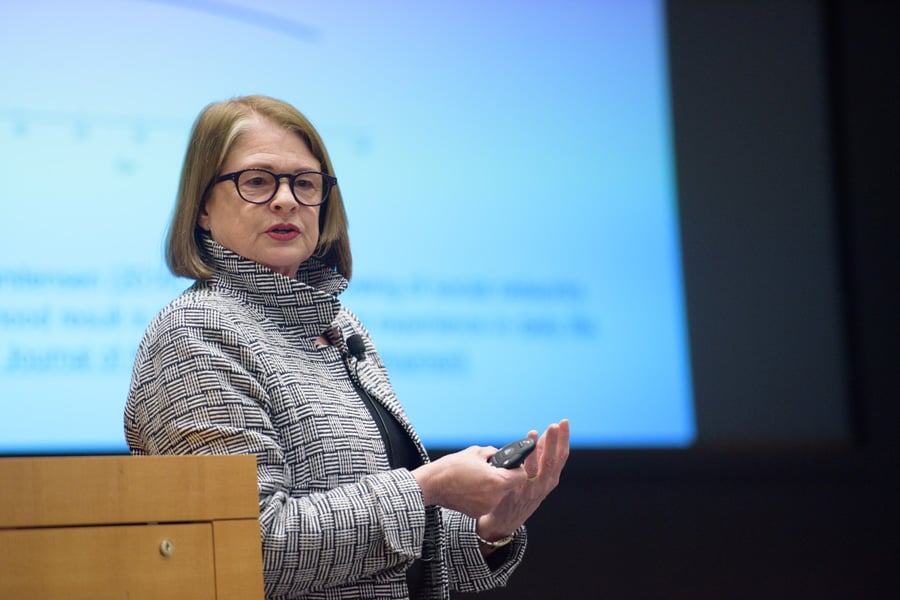Stanford professor gives lecture on age, its relationship to happiness
Jeffrey Wang/Daily Senior Staffer
Stanford University psychology Prof. Laura Carstensen gives a lecture in the McCormick Foundation Center Forum. During the event, which was held to honor former Northwestern Prof. Bernice Neugarten, she shared her research on the some of the benefits of old age.
May 22, 2017
A Stanford University professor said the common perception of old age relating to unhappiness is misguided at a talk on campus Monday.
Prof. Laura Carstensen spoke about the relationship between age and happiness at a lecture hosted by the human development and social policy program at the School of Education and Social Policy.
The lecture, held at McCormick Foundation Center Forum in front of about 70 people, honored former Northwestern Prof. Bernice Neugarten, who helped found SESP’s graduate program in human development and social policy. At the event, Carstensen talked about research from her book, “A Long Bright Future: Happiness, Health, and Financial Security in an Age of Increased Longevity,” which explains that as people age, they tend to appreciate their mortality.
Carstensen noted that there is a false conception that elderly people are sad and lonely. She said as people grow older, they are “pruning their social networks,” leaving the meaningful ones to develop and grow stronger. Based on these observations, Carstensen said she formed the socio-emotional selectivity theory, which says people appreciate mortality more at an older age.
She also said people perceive age and mortality differently as they age. People generally believe old age means sickness, but as science increases life expectancies, these views are changing, she said.
“Ask people if they want to grow old and they say no. Ask them if they want to live a long time and they say yes,” Carstensen said.
SESP sophomore Cassidy Nussman, who attended the lecture, said she was interested in what Carstensen said about goal setting changing with age. Carstensen said goals for individuals at a young age tend to be aimed toward attaining more knowledge, while individuals at an older age set goals for savoring the time they have in the present.
“She put her research in a way that was easy to follow and more digestible,” Nussman said.
Jerry Neugarten, Bernice Neugarten’s son, said he was very impressed with Carstensen’s work and how she made complicated ideas sound simple. He said his mother would have appreciated Carstensen’s positivity. Bernice Neugarten, who died in 2001, also fought the “mythology” of older people being “miserable and sick,” her son said.
SESP Prof. Dan Lewis, who worked with Bernice Neugarten, called Monday’s lecture “smart and modest.”
Carstensen said she hopes to continue her research into the hopeful side of aging.
“We are encouraged that we may be able to use some of this information that we have learned to both encourage social engagement in communities and families in a meaningful way” Carstensen said, “And perhaps find ways that we can help younger people be happier as well.”
Email: [email protected]
Twitter: @juliaesparza10


